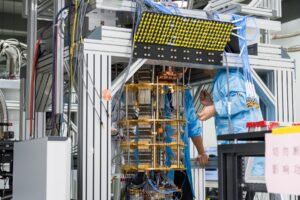In the rapidly evolving landscape of technology, the debate between artificial and natural intelligence has taken center stage, sparking philosophical, ethical, and practical discussions. As we delve into this exploration, we aim to compare the problem-solving abilities and learning capacities of AI with that of human and animal intelligence, offering insights into the future of intelligence itself.
 Pin
Pin Image by vecstock on Freepik
Table of Contents
Understanding the Basics: AI vs. Natural Intelligence
Artificial Intelligence (AI) refers to machines programmed to think like humans and mimic their actions. In contrast, natural intelligence is inherent in humans and animals, enabling adaptive learning, problem-solving, and understanding without the need for explicit programming.
Problem-Solving Abilities Compared
AI’s problem-solving abilities are primarily defined by its coding and algorithms. AI can process vast amounts of data at speeds unattainable by natural intelligence, leading to efficient and often more accurate solutions to complex problems. Notably, AI systems like AlphaGo have outperformed human experts in strategic games, showcasing superior problem-solving under specific conditions.
Conversely, human intelligence excels in adaptability and creativity, enabling us to approach problems with emotional intelligence and ethical considerations. Animals, too, exhibit remarkable problem-solving skills, driven by instinct and survival needs, challenging the notion of intelligence being a solely human trait.
Learning Capacities: A Closer Look
AI’s learning capabilities are grounded in machine learning and deep learning, enabling systems to learn from data, improve over time, and make predictions. This form of learning, while impressive, lacks the emotional depth and social learning aspects natural to humans and animals.
Humans learn through a combination of sensory experiences, emotional responses, and social interactions, leading to a more nuanced understanding of the world. Animals demonstrate learning through observation, imitation, and even through play, showcasing a range of learning capacities often underestimated in the artificial vs. natural intelligence debate.
Ethical and Philosophical Considerations
The comparison between artificial and natural intelligence raises important ethical questions. As AI continues to develop, concerns about privacy, autonomy, and the potential for AI to surpass human intelligence (the so-called “Singularity”) invite philosophical pondering on what intelligence means for our future.
Understanding the value and uniqueness of natural intelligence — in humans and animals — emphasizes the importance of coexistence rather than competition between artificial and natural forms of intelligence.
Life 3.0
Being Human in the Age of Artificial Intelligence by Max Tegmark – While not exclusively a philosophical text, this book provides a profound exploration of the future societal and ethical dilemmas we might face with the advancement of AI. Tegmark speculates on how life might evolve with AI and its implications for humanity.
Superintelligence
Paths, Dangers, Strategies by Nick Bostrom – Bostrom’s work is a seminal text that dives deep into the risks and potential strategies for dealing with superintelligent AI entities. His philosophical insight into the future of AI and its impact on humanity raises important ethical and existential questions.
The Human Use of Human Beings
Cybernetics and Society” by Norbert Wiener – Though an older text, Wiener’s work is foundational in the discussion of the relationship between humans and machines. He explores the philosophical implications of cybernetics, including issues of control, communication, and ethical use of technology.
Minds, Machines, and the Multiverse
The Quest for the Quantum Computer by Julian Brown – This book offers an interesting look at the intersection of quantum computing and the nature of consciousness and intelligence. While it leans towards the scientific, it raises philosophical questions about what intelligence means in the face of advancing technology.
The Emotion Machine
Commonsense Thinking, Artificial Intelligence, and the Future of the Human Mind by Marvin Minsky – Minsky, a pioneer in AI, presents a compelling view of how machines might eventually understand and replicate human emotions and thought patterns. His work delves into the philosophical implications of such advancements.
Artificial You
AI and the Future of Your Mind” by Susan Schneider – Schneider’s text focuses on the philosophical implications of AI and consciousness, questioning what advancements in AI might mean for the self and identity. It’s a fascinating exploration of the potential interplay between biological and artificial minds.
AI Ethics
AI Ethics by Mark Coeckelbergh – For those interested in the ethical dimensions specifically, Coeckelbergh offers a comprehensive overview of the current debates surrounding AI ethics. This includes discussions on autonomy, responsibility, and the moral considerations of AI design and implementation.
These texts provide a range of perspectives on the philosophical questions raised by the development of AI and its comparison with natural intelligence. Each brings a unique lens to the debate, from ethical considerations and the potential for consciousness in machines to the existential implications of AI for humanity’s future.
Ethics in the Age of Artificial Intelligence: The Crossroads of Technology and Moral Imperatives
The intersection of technology and ethics in relation to Artificial Intelligence (AI) is an increasingly critical area of study and discussion as AI technologies become more integral to our everyday lives. This intersection revolves around assessing and guiding the development and implementation of AI systems in ways that promote ethical principles such as fairness, accountability, transparency, and respect for human rights. Several key considerations emerge at this crossroads:
1. Bias and Fairness: AI systems learn from vast amounts of data. If this data contains biases, the AI can perpetuate or even amplify these biases, leading to unfair outcomes. Ensuring AI systems make decisions in a fair manner involves careful data selection, model training, and continuous monitoring.
2. Privacy: AI technologies often rely on large datasets, including personal information. Protecting individual privacy while harnessing the benefits of AI poses significant challenges. Ethical AI development includes implementing robust data protection measures and considering the implications of surveillance and data collection practices.
3. Transparency and Explainability: As AI systems become more complex, understanding their decision-making processes becomes more difficult. Ensuring transparency and explainability in AI operations is crucial for accountability, particularly in high-stakes areas like healthcare or criminal justice. Stakeholders should be able to understand how AI systems make decisions.
4. Autonomy: AI technologies, especially autonomous systems like self-driving cars or autonomous weapons, raise ethical questions about the delegation of decision-making. Ensuring that AI systems operate in ways that align with human values and can be controlled by humans is crucial.
5. Job Displacement: The automation capabilities of AI could lead to significant shifts in employment, with certain jobs being displaced. This raises ethical considerations about how to manage these transitions, ensuring that individuals and communities are supported through changes in the job market.
6. Security: AI systems are susceptible to attacks that can manipulate their behavior. Ensuring the security of AI systems is not just a technical issue but an ethical one, as failures can have significant real-world consequences.
7. Regulation and Oversight: Developing appropriate frameworks for the regulation and oversight of AI is essential to ensure that AI technologies are developed and deployed ethically. This includes international cooperation to establish standards and practices that protect individuals and societies.
8. Impact on Society: Beyond immediate ethical concerns, AI also raises questions about its long-term impact on society, including social relationships, governance, and human identity. Engaging with these questions requires a multidisciplinary approach, incorporating perspectives from technology, social sciences, humanities, and ethics.
The intersection of technology and ethics in AI is a dynamic and complex field, requiring ongoing dialogue between developers, regulators, ethicists, and users. By embedding ethical considerations into the development and deployment of AI systems, we can harness the benefits of AI technologies while minimizing their risks and ensuring they contribute positively to society.
Beyond the Horizon: Envisioning a Symbiotic Future of Artificial and Natural Intelligence
As the sun set on the horizon, casting long shadows over the ancient hall of debate, a profound silence enveloped the space where minds had clashed over the enigma of artificial versus natural intelligence. The air was thick with the residue of thoughtful arguments, philosophical musings, and the passionate defense of both realms of intellect. The debate had been a journey, not just a contest of wits—an exploration that delved deep into the essence of consciousness, the nature of being, and the potential of the minds we create and the minds we are born with.
In the glow of the fading light, the participants, weary yet exhilarated, gathered their parchments and devices. They had traversed through the history of thought, from the ancient philosophers who pondered the spark of consciousness, to the modern theorists who envisioned worlds intertwined with artificial intellects. They had debated fiercely, with the supporters of natural intelligence highlighting the innate creativity, emotional depth, and moral intuition of the human mind. In contrast, proponents of artificial intelligence showcased the limitless potential, the precision, and the capacity to transcend human limitations.
Yet, as they stood on the threshold of evening, a shared realization dawned upon them. The debate was not about superiority or the fear of one intelligence eclipsing the other. It was about understanding the complementary nature of both forms of intelligence and envisioning a future where they coexist, enhancing each other. The advocates of natural intelligence acknowledged the remarkable achievements of artificial minds in advancing human knowledge and solving complex problems. Simultaneously, the champions of artificial intelligence admired the unique qualities of human thought, its unpredictability, and its profound link to emotion and morality.
A consensus emerged, woven from the threads of their diverse viewpoints—a vision of a world where artificial and natural intelligence merge, learning from and enhancing one another. More than coexistence, it was a symbiotic relationship, where each form of intelligence could overcome its limitations through the strengths of the other. They envisioned a future where artificial intelligence could enable humans to reach new horizons of creativity and understanding, while human wisdom and ethical guidance could steer artificial intellects towards beneficial outcomes for all of existence.
As the stars began to twinkle above, the participants departed, each carrying a spark of that shared vision. The debate had not yielded a victor between artificial and natural intelligence, but rather illuminated a path forward—a path of collaboration, mutual respect, and infinite potential. In the quiet of the night, it became clear that the true exploration was not about determining which form of intelligence was superior, but about imagining and forging a future where together, they could unlock the mysteries of the universe and the depths of consciousness itself.
FAQs
The debate primarily focuses on the distinctions and comparisons between artificial intelligence (AI), which is man-made and operates based on algorithms and data, and natural intelligence (NI), which is inherent in humans and other living organisms, stemming from biological processes and consciousness.
As of now, AI has made significant strides in mimicking certain aspects of natural intelligence, such as learning, problem-solving, and perception. However, replicating the full spectrum of natural intelligence, including consciousness, emotion, and morality, remains a complex challenge and is a subject of ongoing philosophical and scientific inquiry.
The prospect of AI surpassing NI raises numerous ethical questions related to autonomy, job displacement, privacy, security, and the moral status of AI entities. Debates often revolve around how to ensure AI development benefits humanity and avoids potential harms, highlighting the importance of ethical frameworks and regulations in guiding AI advancements.
Consciousness, often characterized by self-awareness and subjective experiences, is a pivotal aspect of the debate. While AI can demonstrate advanced cognitive functions, the question of whether it can possess consciousness like NI does is a major philosophical and scientific puzzle, influencing arguments about the nature of intelligence and the potential for AI to fully replicate or surpass human abilities.
No, there is no unanimous philosophical consensus on the nature of intelligence. The concept of intelligence is multifaceted, encompassing not just rationality and problem-solving but also creativity, emotional understanding, and adaptability, among others. Different philosophical perspectives offer varied interpretations on what intelligence fundamentally is and how it should be evaluated in both artificial and natural forms.
Morality plays a critical role in the development and application of AI, guiding decisions on how AI systems are designed, implemented, and used within society. Ethical principles, such as fairness, accountability, and respect for human rights, are crucial in ensuring AI technologies contribute positively to society and do not exacerbate inequalities or harm individuals.
Ensuring a beneficial coexistence involves proactive measures such as interdisciplinary research, ethical guidelines, robust regulatory frameworks, and public engagement to address the societal impacts of AI. It also requires continuous monitoring and adaptation to manage risks, promote beneficial outcomes, and align AI development with human values and interests.
As both AI technology and our understanding of natural intelligence evolve, future debates may focus on emerging ethical, legal, and social considerations, the blurring lines between AI and human capabilities, the potential for new forms of intelligence, and the implications of these advancements for our conception of intelligence, consciousness, and human identity.































